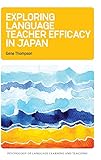Exploring Language Teacher Efficacy in Japan / Gene Thompson.
Material type: TextSeries: Psychology of Language Learning and TeachingPublisher: Bristol ; Blue Ridge Summit : Multilingual Matters, [2020]Copyright date: ©2020Description: 1 online resourceContent type:
TextSeries: Psychology of Language Learning and TeachingPublisher: Bristol ; Blue Ridge Summit : Multilingual Matters, [2020]Copyright date: ©2020Description: 1 online resourceContent type: - 9781788925396
- 9781788925402
- English language -- Study and teaching (Higher) -- Japanese speakers
- English language -- Study and teaching (Higher) -- Japan
- Second language acquisition -- Study and teaching -- Japan
- LANGUAGE ARTS & DISCIPLINES / Study & Teaching
- Japanese high school teachers of languages
- language acquisition
- language teacher cognition
- language teacher efficacy
- language teacher self-efficacy
- psychology of language teaching
- self-efficacy beliefs
- teacher agency
- PE1068.J3 T485 2020
- online - DeGruyter
| Item type | Current library | Call number | URL | Status | Notes | Barcode | |
|---|---|---|---|---|---|---|---|
 eBook
eBook
|
Biblioteca "Angelicum" Pont. Univ. S.Tommaso d'Aquino Nuvola online | online - DeGruyter (Browse shelf(Opens below)) | Online access | Not for loan (Accesso limitato) | Accesso per gli utenti autorizzati / Access for authorized users | (dgr)9781788925402 |
Browsing Biblioteca "Angelicum" Pont. Univ. S.Tommaso d'Aquino shelves, Shelving location: Nuvola online Close shelf browser (Hides shelf browser)

|

|

|

|

|

|

|
||
| online - DeGruyter Usage-Based Dynamics in Second Language Development / | online - DeGruyter Exploring (Im)mobilities : Language Practices, Discourses and Imaginaries / | online - DeGruyter L2 Grammatical Representation and Processing : Theory and Practice / | online - DeGruyter Exploring Language Teacher Efficacy in Japan / | online - DeGruyter TheEmbodied Work of Teaching / | online - DeGruyter A Transdisciplinary Approach to International Teaching Assistants : Perspectives from Applied Linguistics / | online - DeGruyter Research Methods for Complexity Theory in Applied Linguistics / |
Frontmatter -- Contents -- Figures and Tables -- Abbreviations and Japanese Terms -- About the Author -- Acknowledgments -- Preface -- 1. Introduction -- 2. Teacher Efficacy as a Form of Self-Efficacy -- 3. Language Teacher Efficacy -- 4. Approaches for Investigating Language Teacher Efficacy -- 5. Developing a Language Teacher Efficacy Scale -- 6. JTE Language Teacher Efficacy Beliefs and Dimensions -- 7. Language Teacher L2 Efficacy and L2 Usage -- 8. Efficacy for Language Instruction -- 9. Efficacy Towards Collaborative Practice and Collective Action -- 10. Language Teacher Efficacy Belief Development -- 11. Where Next for LTE Research? -- References -- Index
restricted access online access with authorization star
http://purl.org/coar/access_right/c_16ec
This book examines language teacher efficacy beliefs, focusing on the individual and collective beliefs of Japanese high school teachers who carry out language teaching activities in the pursuit of learner language acquisition. It discusses personal and collective dimensions of language teacher efficacy related to personal second language (L2) capability, instructional L2 efficacy and collective capability towards collaboration. The book provides a detailed discussion about the ways in which these beliefs develop and situates the findings within the wider field of teacher efficacy research. It helps further understanding of factors that may influence teacher self-efficacy and suggests new directions for research to explore in future studies. It will appeal to postgraduates and researchers with an interest in language teacher cognition, the psychology of language teaching and those in the wider fields of self-efficacy, teacher efficacy and teacher agency. It is also of use to those with an interest in the high school English education system in Japan, as well as researchers investigating similar contexts.
Mode of access: Internet via World Wide Web.
In English.
Description based on online resource; title from PDF title page (publisher's Web site, viewed 25. Jun 2024)


